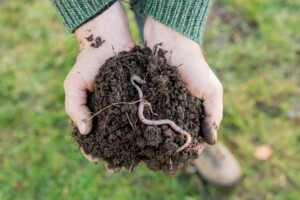 Soil is an essential non-renewable resource that plays a central role in our lives by providing healthy foods and sustainable materials for a growing world population. In order to specify the conditions for a healthy soil and soil restoration, the European Commission (EC) is currently developing a new EU law on soil health. European Bioplastics (EUBP) welcomes the EC initiative and supports the legislative process by providing comprehensive industry expertise.
Soil is an essential non-renewable resource that plays a central role in our lives by providing healthy foods and sustainable materials for a growing world population. In order to specify the conditions for a healthy soil and soil restoration, the European Commission (EC) is currently developing a new EU law on soil health. European Bioplastics (EUBP) welcomes the EC initiative and supports the legislative process by providing comprehensive industry expertise.
It is crucial that the new law also takes into consideration and supports the important role of compostable plastics. They can bring several benefits to composting and organic waste management as they, amongst other things, help to (a) increase the separate collection of bio-waste and (b) recover food- waste that is attached to (food) packaging that would otherwise be discarded and lost if the packaging is sieved out from the bio-waste stream. They also (c) reduce the contamination of compost with conventional plastics and (d) reduce the moisture content and increase the bulking effect, which is useful when composting food waste.
Industrially compostable plastics (certified according to the harmonized European standard EN 13432) can provide value through organic recycling as an additional waste treatment option and by providing the means to make the separate collection of household food waste more efficient. A best-case example of compostable plastic is Italy, where certified compostable packaging is widely supported and used. In 2018, a separate collection rate of household food waste of 80 percent was achieved.
By improving the separate collection of organic waste, industrially compostable plastics also contribute to reducing the contamination of bio-waste with conventional plastics, and ultimately reduce microplastics from fossil-based polymers in the compost. Because biodegradable polymers do not erode into permanent secondary microplastics upon degradation, as most natural environments habit microbes that are able to metabolise these polymers. Hence, biodegradable plastics help to minimise environmental impacts and reduce the accumulation of particles in different environmental habitats.
Soil-biodegradable mulch films are a good example for the industrial use of biodegradable plastics. They have been available in the market for many years, playing an essential role in modern agriculture as they help to increase yield, improve the quality of crops, enhance weed control, and reduce water irrigation and pesticides. Compared to conventional (PE) plastic mulch film, soil-biodegradable mulch films fully biodegrade in less than two years and do not accumulate in soils. The advantages over conventional mulch films are also recognized by the United Nations. Soil health is also protected by strict certification processes. The European standard EN 17033 sets clear requirements for biodegradation of mulch films used in agriculture and horticulture.
When developing the new law on soil health, the Commission should also take into consideration that organic recycling creates carbon sinks. Some of the carbon stored in bio-waste that is turned into compost through organic recycling can be converted into very stable forms and remain in the soil for decades. As industrially compostable plastics help feed more bio-waste into organic recycling, they contribute towards creating carbon sinks and help to reduce CO2.
Click here to read the related EUBP position paper on soil health.